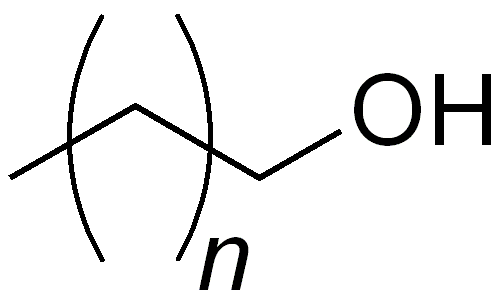Policosanol
 | |
| Clinical data | |
|---|---|
| AHFS/Drugs.com | International Drug Names |
| ATC code | |
| Identifiers | |
| |
| CAS Number | |
| E number | {{#property:P628}} |
| ECHA InfoCard | {{#property:P2566}}Lua error in Module:EditAtWikidata at line 36: attempt to index field 'wikibase' (a nil value). |
| Chemical and physical data | |
| Formula | CH3-(CH2)n-CH2OH n=24-34 |
| Molar mass | (variable) |
| (verify) | |
|
WikiDoc Resources for Policosanol |
|
Articles |
|---|
|
Most recent articles on Policosanol Most cited articles on Policosanol |
|
Media |
|
Powerpoint slides on Policosanol |
|
Evidence Based Medicine |
|
Clinical Trials |
|
Ongoing Trials on Policosanol at Clinical Trials.gov Clinical Trials on Policosanol at Google
|
|
Guidelines / Policies / Govt |
|
US National Guidelines Clearinghouse on Policosanol
|
|
Books |
|
News |
|
Commentary |
|
Definitions |
|
Patient Resources / Community |
|
Patient resources on Policosanol Discussion groups on Policosanol Patient Handouts on Policosanol Directions to Hospitals Treating Policosanol Risk calculators and risk factors for Policosanol
|
|
Healthcare Provider Resources |
|
Causes & Risk Factors for Policosanol |
|
Continuing Medical Education (CME) |
|
International |
|
|
|
Business |
|
Experimental / Informatics |
Editor-In-Chief: C. Michael Gibson, M.S., M.D. [1]
Overview
PolicosanolTemplate:Pronunciation-needed (or polycosanol) is the generic term for a natural mixture of long chain alcohols extracted from plant waxes. It is used as a nutritional supplement intended to lower LDL cholesterol ("bad" cholesterol) and increase HDL cholesterol ("good" or "healthy" cholesterol) and to help prevent atherosclerosis, though some studies have raised questions about the effectiveness of policosanol.
Physical properties
Policosanol is a mixture of a few fatty alcohols derived from the waxes of such plants as sugar cane[1] and yams, as well as beeswax. The most prevalent alcohol in policosanol is octacosanol,[2] followed by triacontanol.
There is a much lower concentration of several other fatty alcohols: behenyl alcohol, lignoceryl alcohol, ceryl alcohol, 1-heptacosanol, 1-nonacosanol, 1-dotriacontanol, and geddyl alcohol.
Modulation of HMG-CoA reductase[3] and bile acid absorption inhibition[4] have been proposed as mechanisms.
Studies
Published studies have come to conflicting conclusions regarding the efficacy of policosanol in lowering LDL (i.e., "bad cholesterol") or raising HDL (i.e., "good cholesterol").,[5][6][7] despite a number of studies funded by the Cuban government, which produces and markets the drug.[8] Older independent clinical trials found no evidence of the efficacy of policosanol,[5] while more recent studies have found effect.
External Links
- Policosanol at PDRHealth.com
- U.S. Patent 6,225,354
References
- ↑ Marinangeli CP, Kassis AN, Jain D, Ebine N, Cunnane SC, Jones PJ (2007). "Comparison of composition and absorption of sugarcane policosanols" (abstract). Br. J. Nutr. 97 (2): 381–8. doi:10.1017/S0007114507336763. PMID 17298709.
- ↑ Ohta Y, Ohashi K, Matsura T, Tokunaga K, Kitagawa A, Yamada K (2008). "Octacosanol attenuates disrupted hepatic reactive oxygen species metabolism associated with acute liver injury progression in rats intoxicated with carbon tetrachloride". J Clin Biochem Nutr. 42 (2): 118–25. doi:10.3164/jcbn.2008017. PMC 2266062. PMID 18385828.
- ↑ Singh DK, Li L, Porter TD (2006). "Policosanol inhibits cholesterol synthesis in hepatoma cells by activation of AMP-kinase". J. Pharmacol. Exp. Ther. 318 (3): 1020–6. doi:10.1124/jpet.106.107144. PMID 16714400.
- ↑ Ng CH, Leung KY, Huang Y, Chen ZY (2005). "Policosanol has no antioxidant activity in human low-density lipoprotein but increases excretion of bile acids in hamsters". J. Agric. Food Chem. 53 (16): 6289–93. doi:10.1021/jf051269a. PMID 16076108.
- ↑ 5.0 5.1 Heiner K. Berthold, MD, PhD; Susanne Unverdorben, MD; Ralf Degenhardt, PhD; Michael Bulitta, Dipl-Stat; Ioanna Gouni-Berthold, MD (May 17, 2006). "Effect of Policosanol on Lipid Levels Among Patients With Hypercholesterolemia or Combined Hyperlipidemia". Journal of the American Medical Association. 295 (19): 2262–2269. doi:10.1001/jama.295.19.2262. PMID 16705107. Retrieved 2006-10-03.
- ↑ Pons P, Rodriguez M, Robaina C, Illnait J, Mas R, Fernandez L, Fernandez JC. (1994). "Effects of successive dose increases of policosanol on the lipid profile of patients with type II hypercholesterolaemia and tolerability to treatment". International Journal of Clinical Pharmacology Research. 14 (1): 27–33. PMID 7927958.
- ↑ Chen JT, Wesley R, Shamburek RD, Pucino F, Csako G (2005). "Meta-analysis of natural therapies for hyperlipidemia: plant sterols and stanols versus policosanol". Pharmacotherapy. 25 (2): 171–83. doi:10.1592/phco.25.2.171.56942. PMID 15767233.
- ↑ Thorsteinsdóttir, Halla; Sáenz, TW; Quach, U; Daar, AS; Singer, PA (2004). "Cuba—innovation through synergy". Nature Biotechnology. 22 (12s): DC19–DC24. doi:10.1038/nbt1204supp-DC19. PMID 15583679.
- Pages with script errors
- CS1 maint: Multiple names: authors list
- Template:drugs.com link with non-standard subpage
- E number from Wikidata
- ECHA InfoCard ID from Wikidata
- Articles without EBI source
- Chemical pages without ChemSpiderID
- Chemical pages without DrugBank identifier
- Articles without KEGG source
- Articles without InChI source
- Articles without UNII source
- Drugs with no legal status
- Drug
- Cardiovascular Drugs
- Hypolipidemic agents